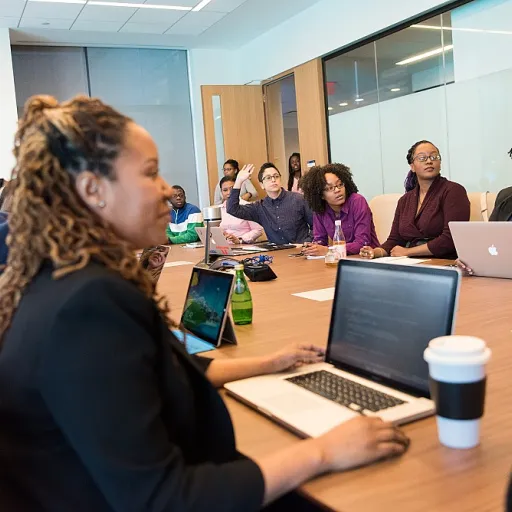
Understanding the foundations of a good hiring process
A good hiring process is essential for organizations seeking to attract and select the best candidates. The process begins with a clear job description, outlining the essential functions and requirements for the role. Employers must ensure that the job description is detailed, accurate, and reflective of the company culture, as this will help potential candidates determine if they are a good fit.
Recruitment strategies should include both traditional and modern approaches, such as leveraging social media platforms to reach a wider pool of candidates. The application process should be straightforward, allowing candidates to submit required documents efficiently. Employers who streamline the process hiring steps will improve the overall candidate experience and increase the likelihood of attracting top talent.
It is important to keep in mind that a structured hiring process reduces turnover rates and enhances the quality of hires. Employers should conduct reference checks and background checks to verify candidate information and ensure compliance with state federal regulations. The inclusion of reference check procedures and clear communication throughout the interview process builds trust and credibility with candidates.
By focusing on these foundational elements, organizations can create a hiring process that is both efficient and fair. The hiring manager plays a critical role in guiding candidates through each stage, from application to job offer. A transparent process, combined with timely feedback and well-crafted interview questions, sets the stage for a positive candidate hiring experience.
Modern recruitment trends: AI, skills-based hiring, and DEI
The landscape of recruitment is rapidly evolving, with AI-driven tools transforming the hiring process. Organizations are increasingly using AI to automate resume screening, schedule interviews, and assess candidates, resulting in a 25% reduction in time-to-hire and a 30% decrease in recruitment costs. This shift allows hiring managers to focus on strategic decision-making and enhances the efficiency of the process hiring steps.
Skills-based hiring is gaining prominence, as employers recognize the value of assessing candidates based on competencies rather than traditional qualifications. This approach broadens the talent pool and ensures that candidates can perform essential functions required for the role. As LinkedIn Talent Solutions states, "76% of talent leaders said skills-based hiring is crucial for filling roles in a competitive job market." Employers who adopt this method can identify the best candidates for each job, regardless of their educational background.
Diversity, equity, and inclusion (DEI) are now integral to the hiring process. Companies are embedding DEI principles in job descriptions, interview panels, and reference checks to create a more inclusive environment. This not only improves the candidate experience but also leads to more innovative and effective teams. For further insights on recruitment trends, explore best practices for hiring managers.
Employers must keep in mind that integrating AI and DEI into the recruitment process requires ongoing evaluation. Regular audits of AI tools and continuous training for hiring managers ensure that the process remains fair and unbiased. By embracing these trends, organizations can build a hiring process that meets the needs of both candidates and employers.
Crafting effective job descriptions and application processes
The job description is the cornerstone of any good hiring process. It should clearly outline the essential functions, required skills, and expectations for the role. Employers must include information about company culture, benefits, and growth opportunities to attract potential candidates who align with organizational values.
An effective application process is user-friendly and accessible, allowing candidates to submit documents and complete required steps with ease. Employers should leverage technology to automate parts of the process, such as application tracking and interview scheduling. This not only streamlines the process hiring experience but also enhances the candidate experience by reducing wait times and administrative burdens.
Reference checks and background checks are critical components of the application process. Employers should conduct thorough reference check procedures to verify candidate information and assess suitability for the role. State federal regulations must be considered to ensure compliance during the hiring process.
To further improve the process, organizations can integrate social media screening and skills assessments. These tools help identify the best candidates and provide additional insights into their abilities and fit for the job. For more guidance on optimizing your hiring process, visit comprehensive recruitment solutions.
Mastering the interview process: questions, structure, and candidate experience
The interview process is a pivotal stage in candidate hiring, providing an opportunity to assess both technical skills and cultural fit. Employers should develop structured interview questions that align with the job description and essential functions of the role. This ensures consistency and fairness across all interviews, allowing for objective evaluation of candidates.
Interview panels should include diverse perspectives to minimize bias and enhance the quality of the hiring process. Employers must keep in mind the importance of creating a welcoming environment, as the candidate experience during interviews can influence their perception of the company. Timely communication and feedback are essential for maintaining engagement and trust throughout the process.
Reference checks and background checks should be conducted after the interview stage to validate candidate information. The hiring manager plays a key role in coordinating interviews, managing documents, and ensuring that all required steps are completed efficiently. Employers should also consider incorporating behavioral and situational interview questions to gain deeper insights into candidates' problem-solving abilities and adaptability.
For organizations seeking to refine their interview process, it is beneficial to review best practices and continuously update interview questions based on feedback and changing job requirements.
Making the offer: reference checks, offer letters, and onboarding
Once the best candidate has been identified, the next step in the hiring process is to conduct final reference checks and background checks. Employers must ensure that all required documents are collected and verified, in accordance with state federal regulations. This step is crucial for maintaining the integrity of the process hiring and safeguarding company interests.
The job offer should be presented in a clear and professional offer letter, outlining the terms of employment, compensation, and any additional benefits. Employers should include information about company culture and expectations to help candidates transition smoothly into their new role. Timely communication during this stage is essential for maintaining a positive candidate experience and securing the candidate's commitment.
Onboarding is an extension of the hiring process, providing new hires with the resources and support needed to perform essential functions effectively. Employers should develop comprehensive onboarding programs that include training, mentorship, and opportunities for feedback. This not only enhances the candidate hiring experience but also improves retention and job satisfaction.
Employers must keep in mind that a well-structured offer and onboarding process reflects positively on the organization and sets the stage for long-term success. Regularly reviewing and updating these processes ensures alignment with best practices and evolving industry standards.
Continuous improvement: evaluating and optimizing the hiring process
A good hiring process is not static; it requires ongoing evaluation and optimization to remain effective. Employers should collect feedback from candidates, hiring managers, and interview panels to identify areas for improvement. Metrics such as time-to-hire, candidate satisfaction, and quality of hires provide valuable insights into the effectiveness of the process hiring steps.
AI-powered recruitment tools can assist in analyzing data and identifying trends, enabling employers to make data-driven decisions. As Bernard Marr notes, "AI-powered recruitment tools are changing the way we find, assess, and hire candidates. This will reduce the time and cost of hiring and result in employees who are a better fit for their roles." Regular audits of AI systems and recruitment practices ensure that the process remains fair, unbiased, and compliant with state federal regulations.
Employers should also review the effectiveness of reference checks, interview questions, and onboarding programs. Continuous training for hiring managers and interviewers is essential for maintaining high standards and adapting to changing job market demands. By fostering a culture of continuous improvement, organizations can build a hiring process that consistently attracts and retains the best candidates.
Incorporating feedback and leveraging technology are key to optimizing the hiring process. Employers who prioritize these elements will create a positive candidate experience and strengthen their employer brand in a competitive market.
Key statistics on good hiring process
- 44% of organizations use AI in recruitment.
- AI implementation leads to a 25% reduction in time-to-hire.
- There is a 16% increase in diversity hires using AI.
- 80% of candidates expect hybrid or remote work options.
Frequently asked questions about good hiring process
What are the essential steps in a good hiring process?
A good hiring process includes creating a clear job description, sourcing candidates, conducting interviews, performing reference checks and background checks, making a job offer, and onboarding the new hire. Each step should be structured to ensure fairness and efficiency.
How can employers improve the candidate experience during the hiring process?
Employers can enhance the candidate experience by streamlining the application process, providing timely feedback, using structured interview questions, and maintaining clear communication throughout each stage. Incorporating technology and focusing on DEI also contribute to a positive experience.













